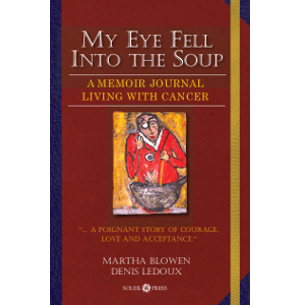Denis Ledoux's Blog, page 54
November 23, 2017
Family Celebrates Thanksgiving with Sadness

Martha Blowen, my partner in life and in work, died on August 18, 2008, from metastasized breast cancer. The following is from collated excerpts of journals we both kept at the time. (Before she passed away, she gave me permission to share her entries.)
The memoir is called My Eye Fell Into the Soup, after a dream in which one of her eyes fell into a cauldron. She later interpreted this to mean she was not paying attention to her health. (This is written about elsewhere.) As with most peop...
November 21, 2017
Memoir Writing Motivation

I have the motivation to write every day because I simply cannot stay away—it is how I process life. Writing helps me understand what has happened and how I feel about it. My father’s Norwegian stoicism and our family’s isolation caused by his alcoholism prevented much communication with anybody, in or out of the family. I turned to writing in order to “talk” to someone. I wrote letters to any relatives and pen pals who would write back, and who I felt were m...
November 16, 2017
Don’t Only Describe Your Characters–Show Them!

The old adage “Show, don’t tell!” is as true as ever. It is one technique that will always improve your writing. I admit that there is some great writing that makes a precedent for “tell,” but as a rule, “show” is more effective.
1. Your pen is your movie camera.In a film, a director ( that’s you!) doesn’t have an actor go on screen to tell the audience that someone is angry. Instead, he shows the character in a scene where anger is in action.
In writing, this means you do not say, “Naomi...
November 7, 2017
What would support for writing your memoir look like for you?

While some people succeed at writing an interesting and meaningful memoir on their own, the fact is many people need both more technical expertise than they now have and more emotional support for the long effort they are undertaking. Many find the task of writing a memoir—however urgent and compelling—to be somewhat daunting and, if the truth be told, rather tedious over the months of solitary writing it takes to tell the story they want to tell and then r...
November 2, 2017
Writing Your Memoir Regularly is Key to Success

As has been bandied about and attributed to many different speakers, it is said that “you go to the office every day for 20 years, and before you know it, you are an overnight success.”
Well, we can apply that bit of humor as an insight on writing your memoir. Write every day for a year or two or three, and, before you know it, you have a book—you’re an “overnight success.”
“How did you find the time?” you are asked.
Time is always with us and it is...
October 31, 2017
A Key to Memoir Writing Success

Do you ever wish you had the key to memoir writing success? Let me offer you one key that, I believe, every writer needs to make use of.
Memoir writing success is built on daily habits.As has been bandied about and attributed to many different speakers, it is said that “you go to the office every day for 20 years, and before you know it, you are an overnight success.”
Well, we can apply that insight to writing a memoir. Write every day for a year or two and before you know it, you have a b...
October 28, 2017
Speaking to the Children About Cancer

For more in the My Eye Fell Into the Soup series, Click Here.
Speaking to the Children About Cancer
November 12, Sunday
Martha:
My days since Thursday have been about sleeping and talking and crying. Just four days ago, everything I thought about my life was different. How life seems changed even though it is not actually different in its essence from what it was on Wednesday. I had cancer then, too, but I did not know it consciously. I have always prided myself on being intuitive and hav...
October 26, 2017
A Memoir is a Marathon. Can you do it?

When you are facing a challenging undertaking, it is wise to seek help. If you were attempting to run a marathon, you would study up on the endeavor and be sure you are doing things right. Perhaps you would join a running club or a website that offers you a programmed course. You would talk to others who have run marathons and perhaps hire a trainer.
How about if you undertake to write a memoir? While some people do succeed at writing an interesting and meaningful me...
October 17, 2017
Evoking Emotions in Your Readers

Instilling your memoir with enough emotion to stir up a response from your readers is do-able. It is undeniably one of the most important results an author must set out to achieve. A memoir seeks to move a reader and without evoking emotions, a memoir cannot move a reader. The beauty of writing is, of course, that you have a great freedom of approach, but there are some basic tips and techniques that, if well implemented, will make it muc...
October 14, 2017
Wanting to run away from Cancer

For other posts in the My Eye Fell Into the Soup series, Click Here.
Wanting to Run Away From CancerNovember 10, 2006
Denis:
So very hard. Terror. Wanting to run away—but there’s no “where” to run to.
Some of the office work must continue. It seems like such an irrelevant thing to do, but there are deadlines our clients have invested in, deadlines that keep revenues coming. If Martha’s cancer crisis lasts for a long time, we will need the income.
I have made a list of a few things that mu...



